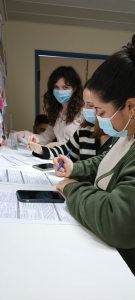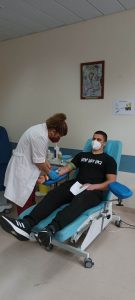Online meeting: 24th March 2023.
Τalking about our collaborative scenarios,
making plans about implementation,
eTwinning and transnational activities.
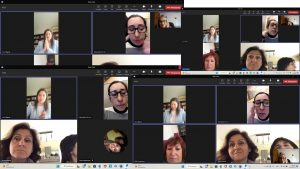
Blue Professions from HELMEPA.
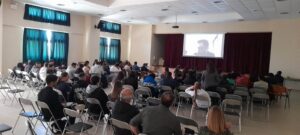
On Friday 17/03/2023 an online briefing on the Blue Professions was held at our school by HELMEPA, the Hellenic Marine Environment Protection Association. Through this briefing, our school has tried to clarify any questions our students had about this interesting sector of sea-related professions.
The presentation was made by Mr Lainos Iasonas, Maritime Manager of HELMEPA. Al students of the first class of our school, as well as, many students who are candidates for the Greek Nationwide Exams, attended the workshop and were able to ask Mr Lainos their questions about the prospects offered to young people by the so-called Blue professions, which concern all professional specialties and the turnover related to the sea.
Responsible organisers of the event were the teachers of our school, Mr. Thomoglou Konstantinos, Economist and Ms Ttsi Paraskevi, Theologos. The technical support of the event was undertaken by IT teachers, Mr. Apostolidis Georgios and Elvanoglou Vassiliou.
Educational Excursion of the 4th GEL to Rome (2022-23)
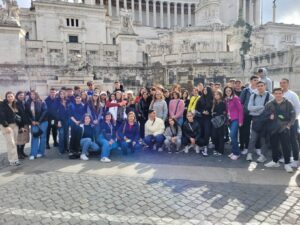
The 4th GE.L. of Rhodes had the opportunity to visit Italy from 8th to 12th March. 56 pupils and 4 accompanying teachers, Mr. Vrontaki Anastasia, Theoulakis Kyriakos, Tsakanika Evangelia and Philippaki Lina took an educational trip to Rome, following an invitation from Tor Vergata University, Italy’s second largest public university, attended by approximately 30.000 students from all over the world.
During the visit, they visited the university’s premises and toured the faculties of law, economics, pharmacy and engineering. After the presentation of the Italian educational system and the presentation of the way the university operates, by the officers of the liaison office, our students had the opportunity to talk with Greek students and to obtain further information about their studies and their lives. As noted by Emmanuela Titi and Giorgos Gouvas, second-year medical students: All science is based on the Greek language and Greek Nationwide Exams are very important, since admission to Italian universities is a prerequisite. The knowledge that comes with the Greek Nationwide Exams is essentially since it is needed for the first year of the university. The best part of student life in Italy is multiculturalism, contacting young people from all over the world.
Visiting our students at the university was in any case a life experience for them. Among the other things they did there, was attending the presentation of a program undertaken by engineering students and related to the creation of a Formula1 car that they design and manufacture entirely themselves, with the contribution of all departments of the university, proving in practice the interdisciplinary nature of science today and the fact that knowledge knows no limits. In addition, our visit to the university offered us the opportunity to realize that European citizens are truly free to study in any country in the European Union they want and to enjoy exactly the same rights.
At the end of the visit, the students offered the organizers of the visit and the Rectorate of the university, souvenirs from Rhodes provided by the kind sponsorship of the Tourism Directorate of the Municipality of Rhodes, as a means of showing our practical gratitude for the hospitality we experienced.
During the excursion, students visited Florence and Rome’s most important monuments. They also toured the Vatican state and realized that Rome is the only existing example of a city often defined as the capital of two states. Through their visit to all these cultural sites, they had the opportunity to experience the culture of the neighboring country and to strengthen their relations with each other.
Taking part in such an educational trip is always a life experience for children. Everything went smoothly and the accompanying teachers expressed their pride in accompanying such exceptional children. We wish our students to be given many similar opportunities in the future, to enrich their knowledge and experiences.
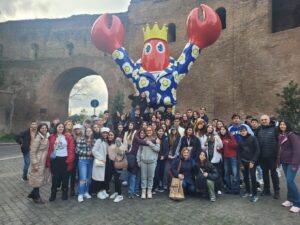
Educational Excursion of the 4th GEL to Rome.
The 4th GE.L. of Rhodes had the opportunity to visit Italy from 8th to 12th March. 56 pupils and 4 accompanying teachers, Mr. Vrontaki Anastasia, Theoulakis Kyriakos, Tsakanika Evangelia and Philippaki Lina took an educational trip to Rome, following an invitation from Tor Vergata University, Italy’s second largest public university, attended by approximately 30.000 students from all over the world.
During the visit, they visited the university’s premises and toured the faculties of law, economics, pharmacy and engineering. After the presentation of the Italian educational system and the presentation of the way the university operates, by the officers of the liaison office, our students had the opportunity to talk with Greek students and to obtain further information about their studies and their lives. As noted by Emmanuela Titi and Giorgos Gouvas, second-year medical students: All science is based on the Greek language and Greek Nationwide Exams are very important, since admission to Italian universities is a prerequisite. The knowledge that comes with the Greek Nationwide Exams is essentially since it is needed for the first year of the university. The best part of student life in Italy is multiculturalism, contacting young people from all over the world.
Visiting our students at the university was in any case a life experience for them. Among the other things they did there, was attending the presentation of a program undertaken by engineering students and related to the creation of a Formula1 car that they design and manufacture entirely themselves, with the contribution of all departments of the university, proving in practice the interdisciplinary nature of science today and the fact that knowledge knows no limits. In addition, our visit to the university offered us the opportunity to realize that European citizens are truly free to study in any country in the European Union they want and to enjoy exactly the same rights.
At the end of the visit, the students offered the organizers of the visit and the Rectorate of the university, souvenirs from Rhodes provided by the kind sponsorship of the Tourism Directorate of the Municipality of Rhodes, as a means of showing our practical gratitude for the hospitality we experienced.
During the excursion, students visited Florence and Rome’s most important monuments. They also toured the Vatican state and realized that Rome is the only existing example of a city often defined as the capital of two states. Through their visit to all these cultural sites, they had the opportunity to experience the culture of the neighboring country and to strengthen their relations with each other.
Taking part in such an educational trip is always a life experience for children. Everything went smoothly and the accompanying teachers expressed their pride in accompanying such exceptional children. We wish our students to be given many similar opportunities in the future, to enrich their knowledge and experiences.
The Teachers: Why do they have the largest proportion of “professional exhaustion” syndrome?

Many say that the teacher’s job is easy. The truth is, that if you really love it, it can fill you and give you a meaning in life, but the strange thing is that that’s exactly why it makes it difficult. For it is this love that makes you seek becoming better and better all the time and find no rest. As for those who don’t make it with care, not only is it not easy, it is tormenting.
WHAT ARE THE REASONS WHY TEACHER’S JOB IS OF INCREASED DIFFICULTY?
From zenith to nadir, unceasingly
One question I ask myself very often is this: “If I were a student, would I like to have me as an educator?” The answer I get of course is not one and unequivocal. Because you see, there are days when I feel superb and that probably the kids are lucky to have me, some days are “so and so” and finally there are the difficult days I just try to take the day out without collapsing and that I feel immense remorse that I did not offer anything important to my students. But what I told you about good, moderate and bad days is not entirely correct. It’s probably hours or even better moments. These erratic and sharp fluctuations in mood, self-esteem, physical and psychic forces are some of the main reasons why the teacher’s work is not at all easy and not for everyone. How many times a teacher goes from heaven to hell and back, from nadir to zenith, cannot be described. I’m sure it’s a job for strong and flexible nerves.
Intensity, responsibility, cancellation and depth exhaustion.
In the past, when I heard someone commenting in a derogatory style that the teacher’s work is very easy and that it does not require any terrible qualifications, I went into the process of refuting his claim with convincing arguments. I seldom succeeded in convincing him and in the end I felt defeated and wronged. Today in a similar case all I do is avenge him with my imagination by putting him even mentally in my place for only an hour in the classroom: “ I imagine him not knowing where to first look, trying desperately to impose order, having to simultaneously handle multiple situations, having to maintain his temper while deep down he has lost it, having to care from the weakest student to the demanding excellent student, from the quietest to the fussiest student, to have to evaluate, repeat, proceed, put exercises that should be done in the classroom and others for homework, and individualize teaching on several occasions and find out with surprise that all that they had read about teaching is totally different from theory to practice. And the last touch: The last class session every Friday.”
Teachers are invited to make too many decisions during the course simultaneously and for many people together. It’s not easy to have to take care of so many people with completely different needs at the same time. It’s not easy to tune so many kids together to do something creative. It is a painful and stressful process for the teacher despite the pleasure of the work being done.
Also, the vast majority of teachers have a deep sense of the role they are called upon to take on, and too many times the feeling of frustration prevails when for various reasons the expectations of teachers are not met by themselves and their students. It is no coincidence that teachers have the highest percentage compared to other professions of burnout syndrome. It is due to the tension, responsibility and frustration that teachers feel.
Many say that teachers rest two months in the summer, while the other workers rest less. But they need to know that teachers on their holidays also do the necessary “healing” for them. That full discharge from the “school class” is a matter of mental equilibrium for them. In several countries, teachers are granted compulsory annual permits every five years where teachers deal with other educational issues outside the classroom.
Defendants and targeted
Teachers nowadays feel that they are constantly under the microscope, that they are not forgiven for the slightest mistake and that others have unreal expectations of them as if they were superhumans. On the other hand, they feel that they are often targeted and blamed for things, for which they do not have the slightest responsibility. That they are charged with all the troubles of the education in their country. Many journalists and politicians have often discredited teachers from the public forum. On the other hand, many parents are biased towards teachers, have unreasonable demands and engage in aggressive behaviors against them even for trivial reasons.
Processing and creation at the same time. The Absolute Dividence
The teacher’s work must above all be creative. Small interactive performances are given daily in front of a particularly demanding audience who most of the time would prefer to be elsewhere. The teacher’s goal is to be able to convince their students to change roles with them and for their students to become the protagonists and creators. But for this to happen, they must feel that they have the freedom to express themselves, to test, to experiment and to make mistakes. In other words, they should be allowed to take roads without a clear pre-destination.
But the educational policies that are usually implemented seek to transform the educator from creators to technocrats and processors. The continuous assessment of students, the assessment of teachers, the teaching scenarios and the lesson plans, the preparation of students only for high performance and for success in exams, the analytical curricula that leave little room for pedagogical freedom, the extension of the educational content to be covered are only some of the things that rip off from teachers any trace of creative mood and diversity between them.
Those who are teachers know very well that in order for a teaching to do well, the responsible preparation it requires comes up to a certain limit. That means that if this limit is exceeded, the lesson risks looking lifeless and indifferent to the students. In a prefabricated lesson, the great danger is the lack of surprise for the teacher himself. After many years of teaching I have come to the following conclusion: no matter how much you have beforehand prepared the perfect lesson, what the students will eventually receive is you, your mood and your enthusiasm. To accomplish this, you need to feel a small dose of insecurity and unpredictableness. So, dealing with the lesson in a processing way does not fulfill this necessity , i.e. to predict and plan everything concerning its course, because the lesson eventually acquires a life of its own which often leads to uncharted paths and which finally, is also a part of its charm.
Teaching must be the birth of the new, not the reproduction of the old. The aim of the school should be to produce new knowledge from the teacher and its students. But the dominant system of power seeks to reproduce itself. So while, it defines as mission of teachers, through the production of new knowledge, the change of the world (progress as it is called), it has invented ways to use teachers for the exact opposite, its preservation. Instead of teachers being meant to be the “power” that aims to cause change, they are used as “inertia” so that nothing changes. This inactivation of teachers is achieved through the complete automation of their work. Teachers feel that they are simply “gears” of a system that they are working on, but that they don’t really believe in. But the majority of them, instead of accepting this role and making their lives much easier, they choose the difficult path: resisting the role of “gear”. In other words, they feel divided between what they are asked to do and what their soul calls them to do. However, creating and at the same time acting in a processing way is completely debilitating.
THE REAL REASONS TEACHERS ACCEPT SUCH ATTACKS
Since they don’t make money. Since, especially in our country, they take no encouragement. Since good working conditions do not excist (many teachers have literally moved to other cities, others are with a suitcase at hand and some are on the streets every day going from school to school). Even the fact that they have two months of vacation cannot be enough for such an attack since this is a global practice. So what is it that puts teachers at the target of a large part of public opinion?
It is the finding that the vast majority of teachers love their work and insist on dreaming about it in a period of complete cynicism. Yeah, that’s what bothers, no matter how paradoxical it sounds. Especially nowadays, love of your work can be considered a rare event since there are few professionals from other professions who love their own work. While teachers may be accused of reaching the limits of professional perversion since they are willing at any time to start enthusiastically discussing their students and their work, other professionals most often avoid talking about their own jobs and when they finally speak you hear more negative and problematic situations than positive approaches about them.
The strange thing is that instead of the rest of the world rewarding teachers’ love and dedication to their work, a large proportion of them have a negative attitude towards them for that very reason. In conclusion, we have to think that it is completely absurd and unfair not to love teachers when they are motivated by love for children and education.
So, obviously, a lot of people come to the conclusion that since teachers love their work then logically it should be easy. They’re making a big mistake. The real reason teachers love and endure their work is that they find a meaning in it, that they believe in its value and that they think they offer something important to children. Because it is a job that, despite its extremely great difficulty, compensates morally, ideologically and emotionally — in no way materially — the one who does it with love.
I personally think that David Graeber (a well-known British professor of social anthropology at the London School of Economics) gives the most appropriate answer to why teachers are being so strongly attacked by a large portion of the world: This is the strange genius of the leaders of our society: to ensure that the anger of the world is directed against those who practice meaningful and meaningful professions, against those whose work has a clear and undisputed social role to play. It seems in this society that the more beneficial a man’s work is to others, the more he should not be paid for it.
Through these words of Graeber, I finally understood why I never liked the word “function” as far as teachers are concerned. I always preferred the word “work”.
Dimitris Tsirigotis. Physicist
Blood Donation by the students of the 4th GEL of Rhodes.
The recent national tragedy in Tempi once again brought to the fore the great needs that always exist for blood. In this context, the 15- member student council, the Association of Teachers of the 4th GE.L. of Rhodes and the Blood Donation Department of the General Hospital of Rhodes organized a voluntary donation on Wednesday 8th March 2023,
which took place in the General
Hospital of Rhodes.
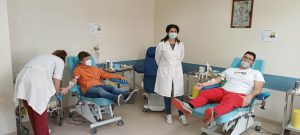
The students of our school participated in this action expressing their solidarity and love towards every fellow human being in need. In this initiative, they had the opportunity to take part in pupils aged 17 or over, parents and teachers who rushed to offer blood in a spirit of selflessness.
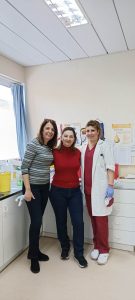
However, it is particularly important to stress that this is not the first time that our school and students have shown their sensitivity to the issue of voluntary blood donation. The 4th GEL organizes every year voluntary donation of students, parents/guardians and teachers, aiming to raise awareness among our children on this issue. Our main goal is for students to understand the necessity of blood donation from healthy citizens to meet hospital needs and the need for a constant repeated voluntary blood supply. At the next stage, it is our priority to accept the obligation and responsibility of each blood donor to safeguard their health and to inform about any action that may endanger the safety of blood donation, realizing that volunteering is an unselfish, deliberate act with a public benefit purpose. Through all this, they seek to realize that voluntary blood donation is ultimately an act of social solidarity.
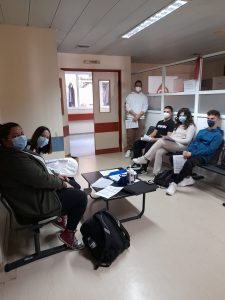
Once again, the kids made us proud and showed us the way. A path of love, offer and solidarity. The Directorate and the Teachers’ Association of the 4th GE.L. Rhodes warmly thank the employees of the Blood Donation Department of the General Hospital of Rhodes and wish the students this blood donation to be the beginning and example for many more in the future.
